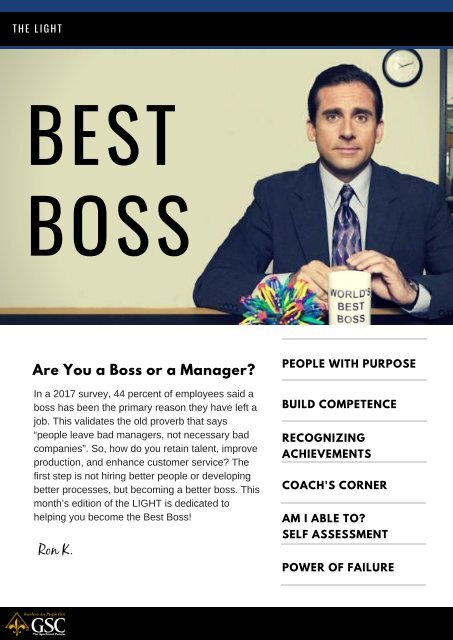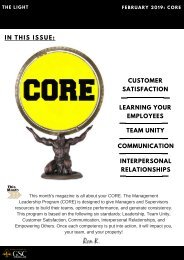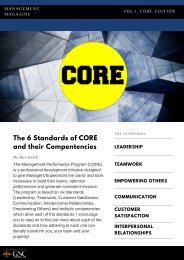You also want an ePaper? Increase the reach of your titles
YUMPU automatically turns print PDFs into web optimized ePapers that Google loves.
T H E L I G H T<br />
BEST<br />
BOSS<br />
Are You a <strong>Boss</strong> or a Manager?<br />
In a 2017 survey, 44 percent of employees said a<br />
boss has been the primary reason they have left a<br />
job. This validates the old proverb that says<br />
“people leave bad managers, not necessary bad<br />
companies”. So, how do you retain talent, improve<br />
production, and enhance customer service? The<br />
first step is not hiring better people or developing<br />
better processes, but becoming a better boss. This<br />
month’s edition of the LIGHT is dedicated to<br />
helping you become the <strong>Best</strong> <strong>Boss</strong>!<br />
PEOPLE WITH PURPOSE<br />
BUILD COMPETENCE<br />
RECOGNIZING<br />
ACHIEVEMENTS<br />
COACH'S CORNER<br />
AM I ABLE TO?<br />
SELF ASSESSMENT<br />
POWER OF FAILURE
People with Purpose<br />
Purpose is a powerful motivator. It gives people something to connect with and strive<br />
toward. This means best bosses will do anything to help employees understand how their<br />
efforts contribute to the achievement of GSC's goals. The boss clearly understands the<br />
vision of GSC and works to translate it into specific individual goals for each employee.<br />
For many bosses, the scariest part of<br />
encouraging ownership is giving up control<br />
and accepting that others’ ideas may be as<br />
good or effective as their own. It requires<br />
self-confidence, a certain degree of tongueholding,<br />
and the ability to support appropriate<br />
risk-taking. It also requires bosses to<br />
understand a certain contradiction about<br />
power. (Kouzes and Posner, 1995).<br />
Encourage Ownership<br />
Giving up control however, doesn’t<br />
mean letting go entirely. It means<br />
providing the needed guidance without<br />
telling people exactly what steps to<br />
take or how to take them. <strong>Best</strong> bosses<br />
know that clear communication,<br />
collaboration, and support all<br />
contributes to ownership. This ensures<br />
that people are working together in<br />
pursuit of departmental goals.<br />
Smart Work<br />
Work that is rampant with obstacles yield little progress and is de-energizing. Mundane and<br />
seemingly irrelevant tasks can be frustrating. Focusing efforts on 'Smart Work' is about<br />
maximizing employees’ ability to perform purposeful and valuable work. Another way to look<br />
at this dimension is that best bosses clearly articulate the primary focus of the organization<br />
(e.g., providing exceptional customer service) and encourage employees, in all they say and<br />
do, to fulfill the mission (Dauten, 1999).
Build Competence<br />
The development of one’s skills and abilities isn’t a switch that can be turned on<br />
and off. In fact, quite the opposite is true. In today’s technologically advanced and<br />
highly competitive workplace, learning needs to be viewed as an ongoing journey.<br />
<strong>Best</strong> bosses understand that to remain valuable everyone needs to continuously<br />
upgrade their<br />
Leadership<br />
skills and abilities.<br />
is when your<br />
vision,<br />
and<br />
Building Competence is about helping<br />
employees take advantage of<br />
opportunities to stretch, grow, and learn.<br />
To do that, best bosses first make sure<br />
that an employee’s current skills are up<br />
to par by matching tasks to skill levels<br />
and encouraging the employee to<br />
complete assignments to high standards<br />
(Thomas, 2000). Second, there needs to<br />
be a plan for where you want them to<br />
go. Assign the individual a task outside<br />
of their comfort zone, something they<br />
cannot break. If they do get it wrong, it<br />
will not be irreputable to the team.<br />
Unfamiliar responsibilities need to be<br />
assigned in small doses. Lastly, there<br />
needs to be a mutual interest in the<br />
desire to grow.
Recognizing Achievements<br />
Recognizing achievements means<br />
acknowledging people’s contributions and<br />
thereby validating their value to the<br />
organization. A large part of recognizing<br />
achievements falls within the framework of<br />
managing performance. <strong>Best</strong> bosses work<br />
with their employees to set expectations and<br />
milestones. Then they make it their business<br />
to stay informed about the employee’s<br />
performance, providing support from the<br />
beginning of the task until the end. When<br />
milestones are achieved, best bosses<br />
personally acknowledge them with<br />
enthusiasm and genuine appreciation.<br />
Respecting the Individual<br />
While it might not be easy or expedient for a boss to do so, showing some<br />
empathy, being non-judgmental, and assuming the best lays the foundation from<br />
which trust, equality, and respect is born.<br />
<strong>Best</strong> bosses have respect for<br />
the skills, talents, and<br />
abilities that employees bring<br />
to the workplace everyday.<br />
They also have respect for<br />
the individual as a person.<br />
This includes their<br />
expectations, contributions,<br />
and experiences. In other<br />
words, best bosses respect<br />
the human element. Respect<br />
is reciprocal in nature: to get<br />
it, one must give it. It’s not<br />
important who starts the<br />
giving process; only that<br />
someone does start it.
Reading available<br />
Further<br />
the GSC Training<br />
through<br />
book of the month is from one of the most respected names in business<br />
Our<br />
leadership. The book gives a rare look at the specifics of how great<br />
and<br />
achieve "common purpose" and success within their organizations.<br />
leaders<br />
is common purpose? It happens the moment a team values objectives<br />
What<br />
unite in a way that enables people to work tirelessly toward a goal.<br />
and<br />
dmeeler@gscapts.com to request your copy today.<br />
Contact<br />
COACHES CORNER<br />
Department
Am I Able To?<br />
What separates a manager from a leader? In order<br />
to become a better leader and boss for your team<br />
you will want to self-assess and reflect.<br />
Below are the five “Am I Able To”<br />
statements that will expedite your<br />
advancement.<br />
1. There are only a<br />
limited number of hours<br />
in the day and many<br />
things to get<br />
accomplished. To<br />
effectively lead a team<br />
and manage people,<br />
delegate. By delegating,<br />
share your knowledge<br />
and strategies for<br />
completing certain tasks.<br />
3. Being a leader is recognizing that your employees are the ones<br />
who make the results happen. Giving credit to your people is an<br />
important part of building trust and keeping your employees<br />
engaged, two goals that every manager should have.<br />
2. <strong>Best</strong> bosses display<br />
patience and transfer<br />
knowledge to their<br />
employees in a way that<br />
is empowering,<br />
relatable, and<br />
understandable.<br />
4. A great leader separates the needs of the business from their<br />
personal emotions in order to make objective decisions. They ask,<br />
“Is this good for the company?”<br />
5. Constructive criticism is an important part of an employee’s development as a<br />
professional and an individual. Are you able to tell someone what they did wrong without<br />
sounding insensitive, rude, or disrespectful? Giving feedback the right way, in the right form,<br />
and at the right time, is a critical skill in leading people.
Self-Assessment<br />
Read each statement below, add up you total points, and use the scale provided to<br />
indicate your management philosophy.
Self-Assessment<br />
Notes:<br />
I identify with<br />
I will work on
The Power of Failure:<br />
The long-term success of a team depends upon how it deals with failure. Each setback<br />
or failure should be viewed as a learning opportunity and explored by the team. The<br />
purpose is not to attribute blame, but to examine the causes and to devise a<br />
mechanism that prevents the failure from reoccurring. Here are the five common<br />
causes of failure:<br />
1. Confused and Conflicting Goals:<br />
When team members do not understand<br />
or share the common goal, then they do<br />
not work in harmony.<br />
2. Unresolved Roles:<br />
When team members are not clear about<br />
their roles and responsibilities. They lack a<br />
sense of accountability and might not<br />
complete their task.<br />
3. Lack of Team Trust:<br />
When team members do not trust<br />
each other or their team leaders,<br />
they undermine the team's efforts.<br />
They might withhold or doubt<br />
information, and that will only<br />
prevent tasks from moving<br />
forward smoothly.<br />
4. Lack of Communication: 5. Negative attitudes:<br />
If team members do not share<br />
their ideas and concerns, the<br />
team will not be able to make<br />
informed decisions.<br />
It’s important to maintain a<br />
certain amount of critical<br />
objectivity. When making<br />
decisions and exploring<br />
options, it is detrimental to the<br />
team if a critical or negative<br />
attitude prevails.
W O U L D Y O U L I K E M O R E I N F O R M A T I O N ?<br />
C O N T A C T U S :<br />
D M E E L E R @ G S C A P T S . C O M<br />
T H E G S C T R A I N I N G D E P A R T M E N T P A G E<br />
G S C T R A I N I N G D E P T












